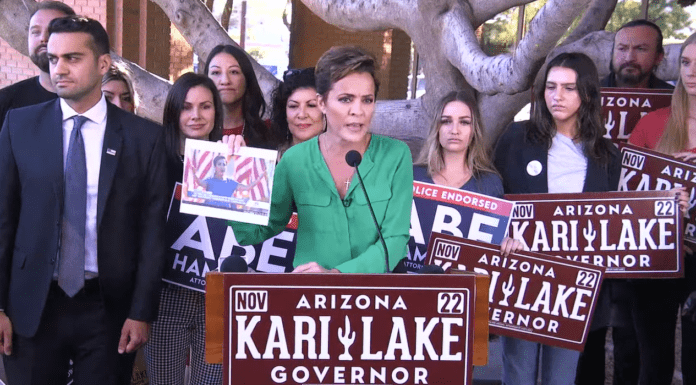(Dmytro “Henry” Aleksandrov, Headline USA) Rasmussen Reports and College Republicans United issued the results of a type of “late exit” poll on Friday that was conducted on Monday and Tuesday, revealing that likely Arizona voters said they voted for former Republican gubernatorial candidate Kari Lake over Katie Hobbs 51% to 43%.
The gubernatorial poll showed that 5% of people who live n Arizona voted for someone else and 2% of people said that they were unsure, the Arizona Sun-Times reported. The poll also revealed that Lake was more popular than Hobbs among women since they voted for her over the latter by a 49 to 43% margin. Also, Arizonans, in general, favored Lake rather than Hobbs. Over 50% of people in Arizona view Lake positively, with 30% of people finding her “very favorable” and only 21% of people saying that they consider Lake “somewhat favorable.” Unlike Lake, Hobbs is not that popular. Overall, only 44% of Arizonans like Hobbs, with 25% of them viewing her as “very favorable” and 19% saying that she is “somewhat favorable.”
The survey also asked voters whether they think the election fraud in the fall midterm election happened or not. Over 50% of Arizonans thought that it was at least somewhat likely that “2022 election irregularities in heavily Republican areas of Arizona happened intentionally to suppress Republican votes.” Thirty-one percent of people also said that they find election fraud “very likely,” with 19% founding it “somewhat likely,” 14% saying that it is “not very likely,” 29% stating that it was “not likely at all,” and 8% admitting they’re not sure.
Rasmussen Reports and College Republicans United also asked whether people think problems in the Maricopa County election affected the outcome of races in Arizona. Fifty-five percent said it likely happened, with 35% saying that it was “very likely” and 20% saying that it was “somewhat likely.” There were, of course, those who disagreed. Eleven percent of people said that it was “not very likely,” 29% said that it was “not at all likely” and 6% said they weren’t sure.

